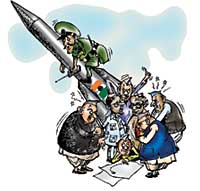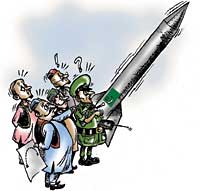
 India and Pakistan, twin nations separated at birth, have demonised each other for the past 50 years of independence. They have fought three wars, and even in times of relative peace, relations have been tense.
India and Pakistan, twin nations separated at birth, have demonised each other for the past 50 years of independence. They have fought three wars, and even in times of relative peace, relations have been tense. The epicentre of the India-Pakistan dispute is the partitioned state of Kashmir. Resolve Kashmir and everything else can slowly fall into place. But with so much anger and bad blood, we can no longer rely on just good sense to prevail, and only trust that the leaders of the two sides will not think the unthinkable. It is no coincidence that India-Pakistan tensions reach breaking point each time there is a domestic crisis. The present war-mongering comes amidst sectarian violence in Gujarat where some 1,000 people have been killed in pogroms this year.
With the war in Afghanistan winding down, there is a real danger of the conflict drifting eastwards. At no time since the 1971 war have tensions been so high. Two years ago when a fierce battle erupted in Kargil, it was the first-ever conflict between two nuclear-armed nations in world history. Western intelligence agencies estimate that up to 12 million people could be killed in a nuclear exchange between the two countries. There is a need to de-escalate, and immediately.
To resolve Kashmir, we have to ask: what do the Kashmiris themselves want? Most there are fed up with the war, fed up with human rights abuses by Indian security forces and foreign militants infiltrating from across the Line of Control. A moderate and democratic Pakistan is in everyone's interest: in President General Pervez Musharraf's interest, and in Prime Minister Atal Behari Vajpayee's. If that is their common goal, there is every reason for the two to work together, and the general needs to be given political space to de-Talebanise Pakistan.
The first immediate step for both sides is to tone down the rhetoric and stop media jingoism. The leaders of India and Pakistan must know that the rest of the world is laughing at them. These two insecure nations want the world to take them seriously just because they have nuclear bombs. The world is getting pretty sick of them crying wolf.
It is time India and Pakistan redefined security. The real security threat for both countries does not come from each other's territory, but from the poverty and inequality within.
Nepal has a lot to lose in case of an India-Pakistan conflagration. It will be a coup de grace for our tourism industry. Thousands of Nepalis are deployed on the front, hundreds of thousands of Nepalis work in Gujarat, Punjab and Haryana-which will be Ground Zero in case of war. And if the war goes nuclear after August then we will be downwind from radioactive fallout.
Nepal has found itself being scapegoated as a hotbed of intelligence activities, and has suffered because these two neighbours haven't been able to get along. As Chair of SAARC, Nepal should be taking a lead in knocking the two heads together, but we have our own problems. And it is time the region looked beyond the play-safe ban on bilateral issues being discussed in the regional body. Otherwise the next time India and Pakistan cry wolf, no one will listen to them.


